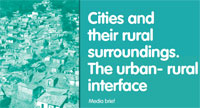
Sustainable Water Management in Cities: Engaging stakeholders for effective change and action. 13-17 December 2010. Zaragoza, Spain
Media briefs
 Water and Cities [
Water and Cities [ - 79 KB]
- 79 KB]
What are the main challenges regarding water issues in cities? Where is the situation most pressing? Who is most affected? When are changes being realized? Why this conference? This brief tries to respond to these and other questions you may have.
 Water quality and sanitation [
Water quality and sanitation [ - 125 KB]
- 125 KB]
Rapid urbanisation brings along several challenges related to water quality issues and sanitation. One out of four urban dwellers does not have access to improved sanitation facilities. 90% of all waste water in developing countries is discharged untreated, polluting rivers, lakes and seas. How cities are coping with these challenges?
 Cities coping with water uncertainties [
Cities coping with water uncertainties [ - 129 KB]
- 129 KB]
Today, many cities are facing severe water uncertainties, such as floods, droughts and upstream activities on transboundary rivers. Climate change and water-related disasters will place increasing demands on urban systems and will result in increased migration to urban areas. The most vulnerable are the urban poor, since they often live in hazardous locations, such as flood plains, and in poor quality housing.
 Water and urbanisation [
Water and urbanisation [ - 129 KB]
- 129 KB]
Half of humanity now lives in cities and, within two decades, nearly 60% of the world's population will be urban dwellers. Urban growth is most rapid in the developing world, where cities gain an average of 5 million residents every month. In Africa and Asia, the urban population will double between 2000 and 2030. Cities are growing because of: natural increase in urban population (50%), reclassification of rural areas as urban areas (25%) and rural-to-urban migration. The exploding urban population growth creates unprecedented challenges, among which provision for water and sanitation have been the most pressing and painfully felt when lacking.
 Cities and their rural surroundings. The urban-rural interface [
Cities and their rural surroundings. The urban-rural interface [ - 123 KB]
- 123 KB]
Cities can no longer be treated as distinct spaces unconnected to the regions surrounding them. The functioning of urban settlements depends on land in the surrounding rural areas for food and water supply, waste disposal, recreational value and the growth of settlements. In order to sustain both urban and rural livelihoods and ecosystems, there is a need for the sustainable management of the resources requirements of urban and peri-urban areas.





 Twitter
Twitter  Facebook
Facebook  Wordpress
Wordpress  YouTube
YouTube